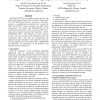Free Online Productivity Tools
i2Speak
i2Symbol
i2OCR
iTex2Img
iWeb2Print
iWeb2Shot
i2Type
iPdf2Split
iPdf2Merge
i2Bopomofo
i2Arabic
i2Style
i2Image
i2PDF
iLatex2Rtf
Sci2ools
115
click to vote
ITRE
2005
IEEE
2005
IEEE
Securing RSVP and RSVP-TE signaling protocols and their performance study
RSVP and RSVP-TE are signaling protocols used to set up paths and/or support Quality of Service (QoS) requirements in IP and MPLS-based networks, respectively. This paper analyzes an authentication mechanism for securing the RSVP and RSVP-TE control messages, and studies their performance. This design and implementation of the authentication mechanism, which is based on RFC2747, using four commonly adopted hash algorithms - MD5, RIPEMD160, SHA-1, and SHA-256, not only improves security, but also provides useful information from the performance aspect. The time for authenticating the signaling messages depends on the algorithm used, and increases slightly in the order of MD5, SHA-1, RIPEMD160 and SHA-256. The performance of the RSVP-TE with multiple sessions was measured.
| Added | 25 Jun 2010 |
| Updated | 25 Jun 2010 |
| Type | Conference |
| Year | 2005 |
| Where | ITRE |
| Authors | Jin Zhi, Chung-Horng Lung, Xia Xu, Anand Srinivasan, Yi Lei |
Comments (0)

